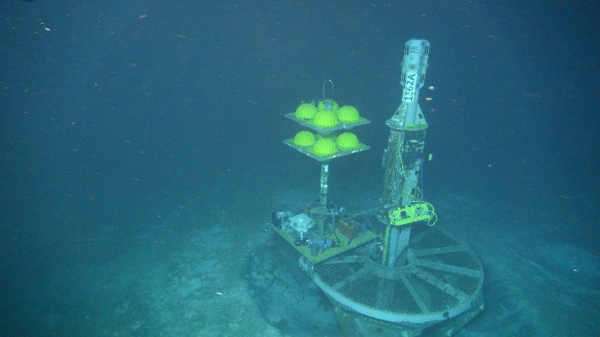Message from the Director:

Seafloor borehole observatories (CORKs) at Juan de Fuca Ridge flank to be revisited this month to make further discoveries about the activity of life in the deep crustal biosphere. Photo courtesy of 2013 Juan de Fuca Ridge flank cruise AT26-03 with ROV Jason (WHOI, chief scientist Andrew Fisher of University of California, Santa Cruz, NSF).
The month of May finds several C-DEBI scientists returning to the Juan de Fuca Ridge flank to examine microbes in the crustal subsurface. Led by C-DEBI Senior Scientist Beth Orcutt, the NSF-funded “Slow Life in the Fast Lane” cruise has a primary objective to measure microbial activity in this environment. Orcutt’s group will be conducting stable isotope incubations in situ and shipboard to measure various microbial metabolisms in this ecosystem, and comparing these to shore-based potential rate measurements. Leveraging these experiments, Orcutt and colleagues will also be applying new cell sorting techniques developed by collaborator Ramunas Stepanauskas to identify active microbial groups in this ecosystem as well as in the overlying water column, with leveraged funding from NASA and NSF. C-DEBI community members Stephanie Carr, Olivia Nigro, and Michael Rappé will also be on the cruise with support from NSF to lead parallel guided cultivation, ecogenomic and viral studies on the crustal fluids in collaboration with an international team of cultivation and thermophilic spore experts. The cruise will take place May 15-28 aboard the RV Atlantis with ROV Jason. Follow along on Twitter at #SlowLifeFastLane.
We also congratulate C-DEBIers who have recently been awarded, promoted or are starting new positions: James Bradley (Assistant Professor at Queen Mary University of London); Jen Glass (Associate Professor at Georgia Institute of Technology); and Everett Shock (Arizona State University), honored with the 2019 Geochemistry Division Medal by the American Chemical Society.
Cheers,
Jan Amend
C-DEBI Director

